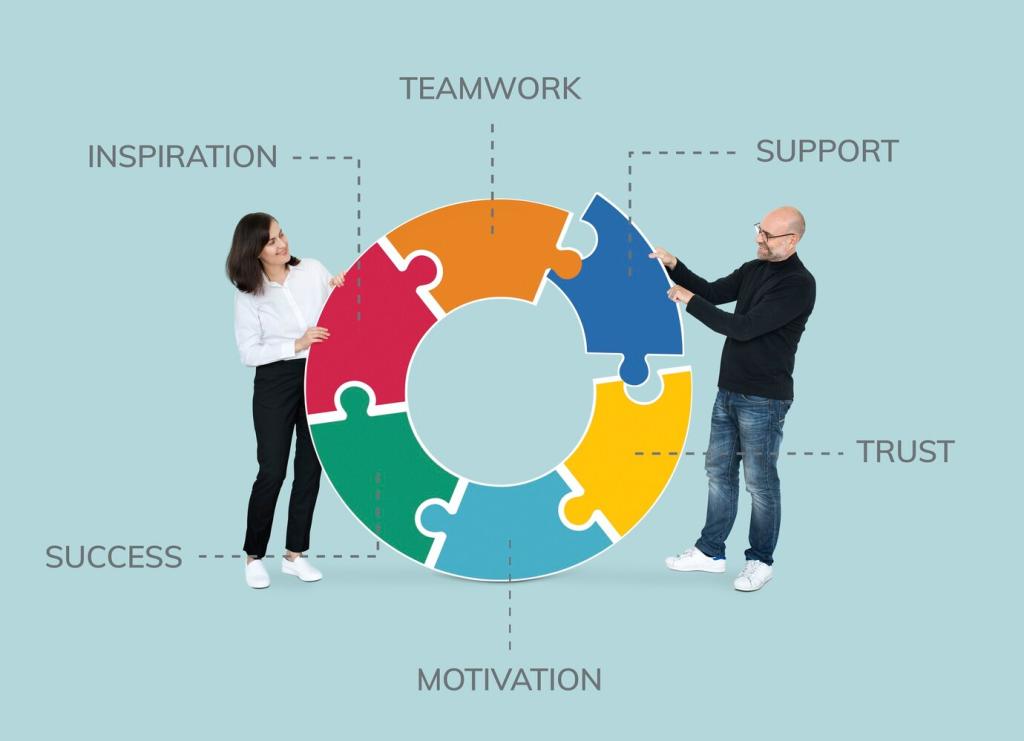Today’s Spotlight: Conflict Resolution Techniques for Teams
Welcome to our deep dive into Conflict Resolution Techniques for Teams. Discover practical methods, real-world stories, and culture-building habits that transform friction into progress. Read, reflect, and share your experiences to help fellow readers master healthier team dynamics.
Understanding Why Team Conflicts Emerge
Misaligned Goals and Hidden Assumptions
Teams often argue about solutions when they actually disagree on outcomes. Surfacing assumptions early prevents circular debates. Ask what success looks like, for whom, and by when, then document it so everyone sees the same target clearly, consistently, and confidently.
Role Clarity and Decision Rights
Conflict frequently masks uncertainty about who decides what. Use simple charters to define responsibilities, inputs, and escalation paths. When people know their scope, they collaborate more and defend turf less, reducing repeated tensions that sap energy and delay delivery unnecessarily.
Resource Limits and Timeline Pressure
Scarcity sharpens disagreements. Acknowledge constraints openly and prioritize together. When a team co-creates trade-offs, conflict turns into problem-solving. Invite stakeholders to validate choices, ensuring pressure is shared appropriately rather than silently transferred onto colleagues unfairly.






Facilitated Techniques for Tough Meetings
A neutral facilitator sets time limits, turn-taking, and confidentiality. Each person shares impacts, not accusations. The mediator summarizes overlap, then helps parties co-create experiments. Document agreements and revisit them after two weeks to reinforce accountability and celebrate early wins together.
Facilitated Techniques for Tough Meetings
Start with individual reflection, then pairs, groups of four, and finally a whole-room share. This method scales diverse input while preventing dominant voices from derailing. It surfaces unexpected alignment and reduces conflict born from silence, anxiety, or unequal airtime among contributors.
Tools That Prevent Conflicts Before They Start
Co-create norms for response times, meeting etiquette, decision processes, and feedback. Keep agreements visible and review them monthly. When conflict arises, point to the agreement instead of the person, making course correction feel fair, predictable, and psychologically safe for everyone involved.


Tools That Prevent Conflicts Before They Start
Choose one framework and stick with it. Define drivers, approvers, contributors, and informed parties. Publicly record decisions with rationale so debate does not restart. Consistency reduces confusion and helps new teammates onboard quickly without revisiting settled territory repeatedly and unnecessarily.
Building Psychological Safety and Trust
Leaders Go First with Vulnerability
Model admitting mistakes and asking for feedback. When leaders show fallibility, teammates feel permitted to raise concerns early. A short weekly “What did I learn?” round fosters humility and collective growth, reducing defensiveness when conflicts inevitably surface under real-world pressure.
Normalize Early, Small Repairs
Encourage micro-repairs: quick clarifications, apologies, and check-ins within 24 hours. Small timely repairs prevent narrative spirals. Invite readers to comment with a personal repair phrase they use, then borrow one for your next tough conversation to keep relationships resilient and strong.
Celebrate Healthy Dissent
Create rituals that praise well-evidenced challenge. For example, a monthly “Courageous Question” award. When dissent is appreciated, people bring risks forward early. Conflicts become opportunities to refine strategy rather than threats to belonging or status within the team’s culture.



A Real Story: Turning a Sprint Meltdown into Momentum
Mid-sprint, engineering and product clashed over shifting requirements. Voices rose, and work stalled. We paused the stand-up, named the conflict explicitly, and scheduled a mediated session. Agreeing to ground rules calmed emotions enough to explore causes without blame or unnecessary dramatics.

